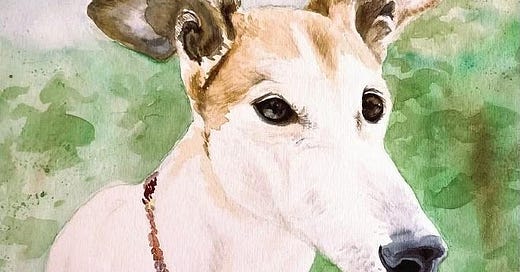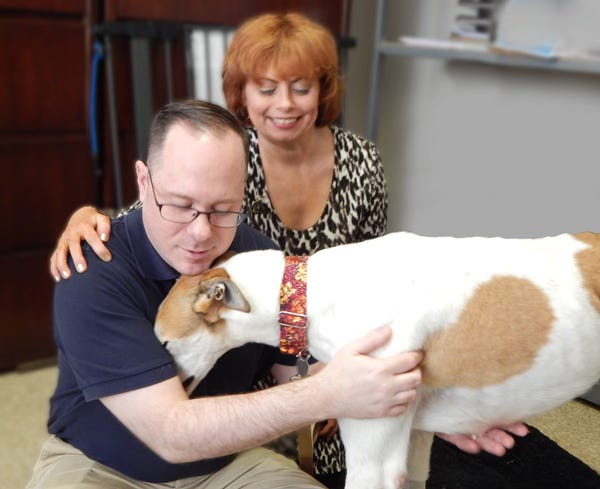Welcome to the third in a series of interviews with authors. Christine A. Dorchak and Carey M. Theil are co-founders of GREY2K USA Worldwide. They are the co-authors of Brooklyn Goes Home: The Rise and Fall of American Greyhound Racing and the Dog that Inspired a Movement, which is published by Lantern Publishing & Media.
Who was Brooklyn and why does he deserve to be the focus of your book about greyhound racing?
Brooklyn was a magical greyhound who inspired a worldwide movement to end dog racing. Our gentle boy was born in Australia, where he failed as a racer. Then, before he was even two years old, he found himself shipped out to the worst dog track in the world. There was no adoption program at the Yat Yuen Canidrome in Macau and every dog who raced there, died there – 400 a year. That could have been Brooklyn’s fate too, but thanks to wonderful people working with us around the world, the track was closed and he was airlifted to safety along with 532 other surviving dogs. He was underweight, his coat dull and dirty, and he had large sores on his legs. Thirteen teeth, worn down to the roots after years of chewing on the bars of his cage, had to be removed. When he was diagnosed with cancer and then suffered a stroke, he should have died again, yet he lived! Brooklyn’s personal story of survival and the way he joyfully greeted each day as a gift taught us to treasure our time on this earth more than ever before.
We wrote Brooklyn Goes Home for two main reasons. We wanted to honor a very special greyhound who came into our lives, changed us in ways we could not imagine, and who made us better people. But we also believed that our story of fighting the cruelty of dog racing could serve to inspire others to reach for change in their own lives. Like Brooklyn, who was left to die at a Chinese dog track, we faced devastating odds and were knocked down many times. We had no money, no clout and no political expertise, and yet we succeeded because we were willing to suffer losses and then begin again. Persistence and tenacity were the key.
People can read our book as a political how-to, which it is! We describe our state-by-state push to outlaw dog racing across the United States and we introduce readers to the diverse group of people who came together to help greyhounds along the way. These folks, Democrat and Republican, old and young, came from multiple walks of life but were united in the singular belief that dogs are family friends, not racing machines. They joined us year after year, often from clashing sides, to become like-minded champions for the greys. Our own dog Brooklyn came to be the living symbol of this shared compassion and love. Through his story, we hope to show that even in these fractured times, change is possible. In fact, it is inevitable.
How close are we to the end of greyhound racing?
Greyhound racing first began in the United States, with the first track opening in Emeryville, California in 1919. Over the next century, there came to be more than sixty American dog tracks. But thanks to the hard work of everyday people who wanted to help gentle hounds, there are now just two remaining.
It has taken more than 100 years to confront and expose this cruel industry and to reach a point where a clear majority of people wants to stop what amounts to industrialized exploitation of dogs. When 69% of Floridians supported our ballot question to shut down the state’s twelve historic dog tracks, we felt the end was quite near. That was in 2018 and yet, we are still fighting a very resilient gambling enterprise. Many years ago, someone reminded us that change is not self-executing and he was certainly right! Until both West Virginia tracks finally close, American greyhounds will still be treated differently than other dogs.
In tandem with our statewide campaign, we are also looking to pass a federal prohibition on dog racing and join hands with animal advocates around the world. The US Greyhound Protection Act will not only outlaw dog racing here, it will also prohibit gamblers from betting on foreign races and also block the export of American dogs for racing elsewhere. Meanwhile, the countries of New Zealand, Scotland and Wales are debating their own prohibitions on dog racing, efforts we fervently support. The trend is definitely with the greyhounds.
You are both experienced animal rights campaigners. Is there anything about campaigning for the end of greyhound racing that makes it different from all other animal rights campaigns?
Greyhounds are dogs, and canines are thought to be members of the family, which is a clear advantage for our work. Track owners knew this too. So throughout the twentieth century, they worked to convince the public that greyhounds were vicious, different than other dogs and not adoptable. Greyhound advocates fought back and beginning in the 1980s, greyhound rescue became quite popular. Public perceptions began to change and for the first time, the racing industry found itself back on its heels and in a glaring spotlight for its maltreatment and misrepresentation of gentle hounds.
While we definitely wrote Brooklyn Goes Home for anyone who has ever loved and lost a dog, our book isn’t just for dog advocates (or for those who want to end greyhound racing). The strategy we used of seeking incremental change while staying grounded in our mission, can be applied to any fight for social justice. We learned to stay true to your goals and to learn from our mistakes. We came to understand and accept that sometimes we had to lose to win. In fact, on more than one occasion, horrible defeat opened up a gleaming path to victory.
One of our board members is a Vietnam veteran, and he advised us early on that our first job was to “stay on the field” and keep focused, whether this be in terms of sustaining our political campaigns, educating the public about dog racing, or helping rescue greyhounds from closing dog tracks. That simple advice has anchored all that we have tried to accomplish for the greyhounds over the last quarter of a century. As a result, ours is the story of how a small non-profit can take on a multi-million dollar animal abuse industry and win.
Another important belief we share in our book is the idea of greyhounds as ambassadors of compassion. Many people are willing to think about the welfare of dogs yet might never consider the needs and rights of other non-human animals at all. But the greyhounds open the door to expanded awareness in a non-confrontational way. If keeping a dog in a small cage is wrong, why would it be right for a pig or a chicken? If taking a dog away from his mother is wrong, then why is this same standard “business-as-usual” for dairy cows and baby chinchillas? In this sense, greyhounds are true ambassadors for animals used for meat, fur and in other animal abuse industries.
Although GREY2K’s campaigns will stay focused on ending dog racing both here and across the globe, it is our hope that readers will find inspiration in our experience and like we did, take a big leap and try to make a difference.
How would you describe what it’s like to live with a rescued greyhound for someone who is thinking of adopting one?
We have always been dog lovers but until we joined together to form our non-profit in 2001, neither one of us had ever adopted a hound. That all changed with Zoe, rescued from Texas in 2005, then Gina from Florida and of course Brooklyn. In our experience, greyhounds make loving family friends and are absolutely some of the gentlest dogs in the world. Our hounds loved each other, and (on most days) they loved our four cats as well! Rescued greyhounds are one of the few animals that can be liberated and then brought home. And we recommend you do.






Wonderful & informative piece! Am forwarding to my Aunty Judy (Proud) now who has adopted many a greyhound over the years.
I didn’t know about this book and I can’t wait to get it. Thank you Kim! You did it again.